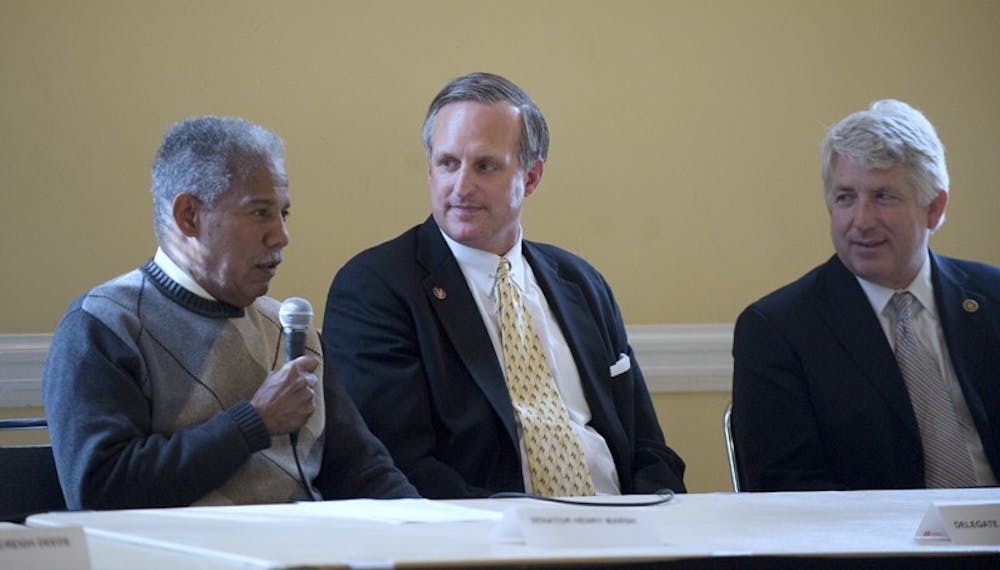Several state legislators visited Grounds yesterday night for a panel hosted by Student Council's Legislative Affairs Committee, opening themselves up for discussion with University students about key topics.
The Alumni and Local Legislators Panel included Sen. Creigh Deeds, D-Charlottesville, Sen. Henry Marsh, D-Richmond, Sen. Mark Herring, D-Fairfax County, Sen. Mary M. Whipple, D-Arlington County, Del. David Toscano, D-Charlottesville, Del. T. Scott Garrett, D-Lynchburg, and Del. James Massie, R-Henrico County.
Although the Legislative Affairs Committee sought a balanced group of panelists, Massie was the only Republican present. To compensate for this imbalance, he was allowed to make twice as many responses as the other panelists.
The panel began with a series of questions posed by the Legislative Affairs Committee co-chairs, followed by a question and answer session during which students addressed the legislators directly.\nConversation largely centered on the impact of state budget cuts to higher education. Virginia's budget is in better shape than that of most other states, Massie said, but panelists agreed that the current state budget shortfall still has required legislators to make difficult choices that would, in turn, require public universities to raise tuition prices.
"Cutting education is like eating your seed corn," Deeds said. "It's an expression that you have no confidence in the future and it's something you should avoid at all costs."
This year's education cuts, however, were mild compared to cuts to those for other state services, Deeds said.
Toscano added, however, that cuts to higher education may jeopardize the primacy of Virginia's higher education institution, which panelists described as the finest public education system in the country - one that exists in a state considered to be one of the best places to raise a child.
This nurturing community, however, only exists because of legislators' investments in public education, Marsh said, adding that he believes cuts will damage that system.
"We wont be able to turn out the highly trained professionals to compete with foreigners, unless we turn [things] around," Toscano said. "Our kids are not going to have the standard of living that we enjoy today."
Panelists also discussed the recently passed federal health care legislation intended to improve the standard of living across the board by ensuring that all individuals have health insurance.
The Democratic legislators agreed that the nation's current health care system will soon come face-to-face with rising premiums and that action must be taken to curb such costs.
Massie, however, said Attorney General Ken Cuccinelli's response to the legislation - a lawsuit - had its merits, noting that the bill represents an unjustified extension of government power because it mandates that all Virginians purchase health insurance.
"I don't know whether it's constitutional or not," he said, "but I do feel the overreach of being told I have to make a private market transaction."
But Deeds disagreed, in accordance with his fellow Democratic panelists, who collectively called the reform a purposeless attempt to "grab headlines" and "further his personal agenda."
Deeds compared the requirement to purchase health insurance to the state's requirement for residents to purchase car insurance.
"This bill is not overreaching. Ninety-five percent of people will have health insurance," Deeds said. "This is a radical bill but [that's not] to say it's a government overreach ... States require automobile insurance. This is a very similar act."
During the student question and answer session, panelists strongly encouraged students to become politically active and involved in their communities.
"Don't be a free-rider," Massie said, "For a free political system to work well, the free citizens have to participate in the process."
Fourth-year College student Katharine Meyer said she thought the panel allowed students to hear legislators' inside perspectives in an informal setting, although she had hoped for more equal party representation.
Legislative Affairs Committee co-chair Vish Apte said he believed the discussion was an important look into local politics.
"A lot of the issues around the budget cuts and tax related issues are often neglected," he said. "This is a forum for both students and legislators to voice and flesh out their concerns about issues like the budget cut, the Attorney General's comments ... all of those issues that are talked about more broadly and never focused on in a more micro setting.







